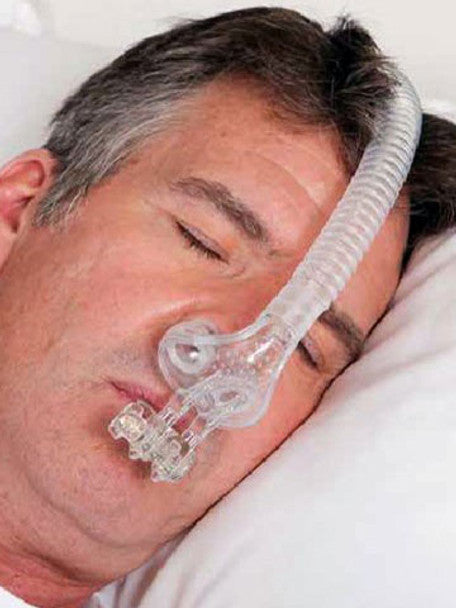If you’ve been diagnosed with obstructive sleep apnea, few things are more important than using a CPAP or BiPAP machine to help you sleep soundly through the night. By ensuring that you have a steady supply of pressurized air, this equipment prevents the interruptions to breathing that can disrupt your sleep and leave you feeling fatigued in the morning.
Unfortunately, some people have a hard time adapting to using a CPAP machine and wearing a mask while they sleep. Some people feel claustrophobic while wearing a mask, any may even take it off during their sleep. Others experience dry mouth as a result of the pressurized air.
Because sleep apnea can have severe long-term consequences to your health, finding a way to work around these common issues is a must. Here are a few tricks that can help you adjust to using a CPAP machine.
Make Sure Your Mask is a Comfortable Fit

The right CPAP mask can be one of the biggest influencers on whether your CPAP experience is comfortable or not. Start by making sure you’ve selected a mask that matches your sleeping and breathing styles.
For example, if you sleep with your mouth open, you should use a full face mask that covers both the nose and mouth. These masks often come with a chin strap to help keep your mouth closed while you sleep. On the other hand, some users prefer a nasal mask because it is less obtrusive and is less likely to get knocked about if you roll around a lot in your sleep.
Regardless of the type of mask you choose, you should tighten the straps so the mask fits snugly against your face. This will prevent air leaks. Avoid over-tightening the mask to prevent skin irritation and discomfort. You may need to test multiple masks before finding a comfortable fit. Many manufacturers offer masks in several sizes to better fit different face shapes and sizes.
Use Your CPAP Machine’s Humidifier

Some CPAP users complain of waking up with a dry mouth or experiencing a dry, scratchy throat after they begin CPAP therapy. Thankfully, many modern CPAP devices directly counteract this with the addition of a humidifier. Heated humidifiers can greatly improve comfort while using your CPAP machine.
Using a CPAP humidifier will prevent the dryness and irritation that can cause significant discomfort in your mouth and throat. It will also help reduce your risk of congestion and nosebleeds.
Most CPAP machines feature a humidifier water chamber that must be filled up prior to use. This water chamber provides enough water to humidify your air supply throughout the night. However, you must regularly clean the water chamber (as well as the mask and tubing). Failure to clean the water chamber could lead to mineral or bacterial buildup and damage the humidifier.
Additional CPAP Features That Can Help

While a sleep specialist will determine the appropriate air pressure level for managing your sleep apnea, some users find their prescribed pressure to be uncomfortable. Several features found in modern CPAP machines can mitigate this. Consider prioritizing these features when shopping for a CPAP machine.
Auto-ramping settings start the CPAP machine at a much lower air pressure when you first get in bed. Air pressure increases gradually over time, not reaching the prescribed setting until after you have fallen asleep.
Many CPAP machines also include expiratory pressure relief (EPR) settings. This feature slightly decreases the air pressure when the user exhales, allowing for more comfortable, natural breathing. This can be especially helpful if the severity of your sleep apnea requires a high pressure setting. This can also reduce your risk for swallowing air while you sleep.
Consult With a Sleep Specialist
Even after accounting for the above factors, some CPAP users still struggle to adjust to their mask and pressure settings. In such situations, it is best to consult with a sleep specialist to determine next steps. They can use their experience to identify issues with your setup or recommend changes to improve your sleep.
For example, some patients benefit from switching to a BiPAP machine, which offers greater pressure relief than standard CPAP machines. Others prefer an auto-adjusting machine that automatically raises and lowers air pressure levels throughout the night based on its monitoring of the user’s breathing patterns.
Your sleep specialist can determine which changes to your air pressure settings or mask selection could help, or if there are other issues that need to be addressed. Sometimes, cognitive behavioral therapy or certain sleep medications could be needed to help you adapt to using your CPAP machine.
Alternatively, you may be better served by a CPAP alternative, like a sleep position therapy device. The right solution will depend on your sleep patterns and the severity of your sleep apnea. Consulting with an expert will ensure that you get an effective solution tailored to your unique needs.
Using Your CPAP Machine For Better Sleep
For many people, getting used to their CPAP machine is simply a matter of time. While it may feel strange using the machine and wearing a mask at first, the lasting benefits of higher-quality sleep are well worth it.
By getting a good night’s rest free of breathing interruptions, you will no longer feel tired and irritable in the morning. You will lower your risk for long-term health issues like high blood pressure, type 2 diabetes, and stroke. Stick with your treatment, and do what you can to make it more comfortable!

